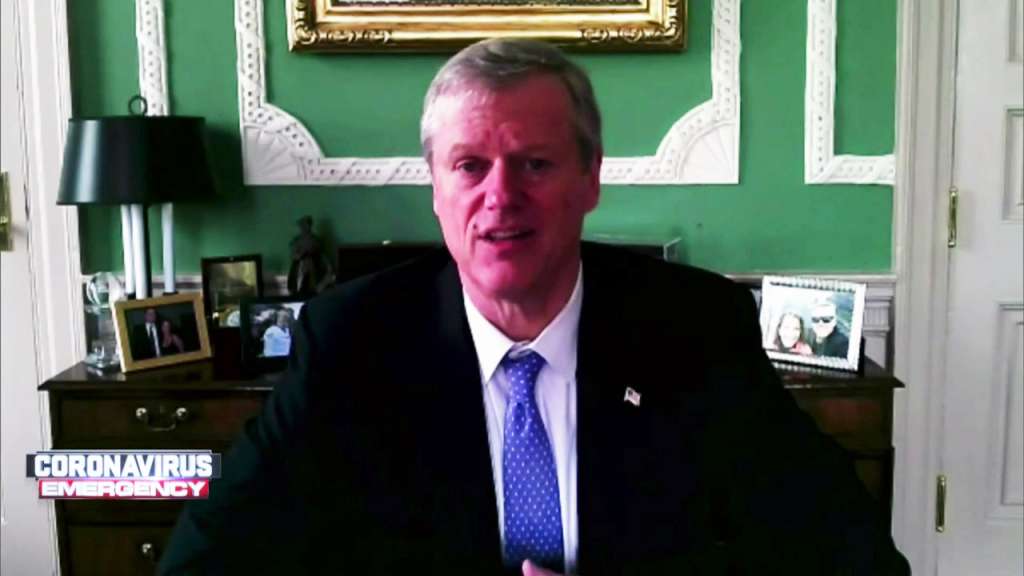With winter weather disrupting life across the South and a storm headed to Massachusetts, Gov. Charlie Baker said Thursday he and other governors have requested permission to send the National Guard to Kentucky and Tennessee to pick up and bring back the states’ next batches of COVID-19 vaccine doses.
“We may have some real issues with supply delivery this week,” Baker said in remarks Thursday morning to the Greater Boston Chamber of Commerce.
The governor’s warning came as southern parts of the country unaccustomed to winter weather have been blasted by snow and ice in recent days, potentially impacting the transport of vaccine to states like Massachusetts.
Demand for new doses crashed the state’s appointment website Thursday morning as the state opened up its vaccination program to resident age 65 to 74 for the first time, and Baker said the state routinely gets requests from providers for more than four times its weekly allotment of about 110,000 doses, which is set to increase next week to about 139,000 doses.
“We had been told it would be a few days late based on some the issues around weather in other parts of the country, but we got told last night that we may see a significant delay in our next shipments,” Baker said.
While he did not address the morning’s website failures, Baker did say Massachusetts and other states had approached the federal government about “taking this one into our own hands” and sending the National Guard to pick up new vaccine doses.
“We can’t afford to go what will be almost a week without getting any new doses from the feds and continue to maintain the appointment schedules that people here expect and anticipate we’ll be able to maintain,” Baker said.
Baker’s speech to the Greater Boston Chamber of Commerce is an annual event, but it took place virtually this year, with Baker live in front of his computer in his State House office.
The governor talked about the state’s vaccine program and the decisions he made to prioritize certain populations, the positive trajectory of COVID-19 cases and his relationship with Boston Mayor Marty Walsh, who is preparing to leave City Hall to join the Biden administration.
“Who would have thought a Bill Weld Republican and labor Democrat would have such a good working relationship, but in some respects it’s more than that. It is a really important personal relationship for me,” Baker said.
He also fielded a question about the appropriateness of proceeding this spring with MCAS standardized testing for students whose learning environments have been totally upended over the past year. Baker said he agreed with Education Commissioner Jeff Riley’s approach of using it to measure progress.
“I think that’s a reasonable, appropriate and absolutely necessary approach to try to gauge what’s happened with kids over the past year,” Baker said.
The governor said the federal government had “put some big-time money” into K-12 education, and was poised through President Joe Biden’s $1.9 trillion American Rescue Plan to make even more funding available for public schools.
Baker said he wold like to see Massachusetts use new money on summer school, “acceleration academies” and other opportunities for kids to help them catch up as COVID-19 cases decline with more vaccinations and more students able to return to the classroom.
“If you don’t do some kind of an assessment to figure out where people are, it’s going to be pretty hard to figure out how to frame what it is you might want to make available to them to help them catch up,” Baker said.
The governor also spent a good amount of time talking about his administration’s focus on the “future of work,” which he teased during his annual State of the Commonwealth address as a challenge that public policy leaders must get right.
Baker mentioned that some industries, like the hotel industry, have been decimated through no fault of their own by the pandemic, and it will be important to develop a game plan for getting those business back on their feet.
The governor said the usual planning work done around job creation and economic development focuses on what industries will create the jobs of the future and how to train workers for those careers.
“This one is more like, how are people going to work. Where are they going to work, where are they going to live based on how and where they can work,” Baker said. “And the reason this is such tough question to answer is because we’re not through the pandemic yet and there clearly has been a year’s worth of people thinking differently about how they do their jobs.”
For instance, Baker said some private sector executives have told him they will have greatly different strategies for how they spend on travel and entertainment, which would impact a variety of sectors dependent on conventions and business travel.
“I’m not saying it’s going ot be easy to guess right on this, because I’m not sure that it is, but I do think it means at minimum we need to really kick the tires on a variety of scenarios here to figure out what June, July, August and September 2021, ’22 and ’23 are going to look like when we get to the other side of this,” Baker said.
(Copyright (c) 2024 State House News Service.

